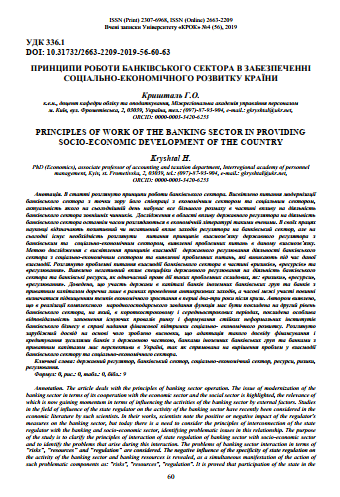PRINCIPLES OF WORK OF THE BANKING SECTOR IN PROVIDING SOCIO-ECONOMIC DEVELOPMENT OF THE COUNTRY
DOI:
https://doi.org/10.31732/2663-2209-2019-56-60-63Keywords:
state regulator, banking sector, socio-economic sector, resources, risks, regulationAbstract
The article deals with the principles of banking sector operation. The issue of modernization of the banking sector in terms of its cooperation with the economic sector and the social sector is highlighted, the relevance of which is now gaining momentum in terms of influencing the activities of the banking sector by external factors. Studies in the field of influence of the state regulator on the activity of the banking sector have recently been considered in the economic literature by such scientists. In their works, scientists note the positive or negative impact of the regulator's measures on the banking sector, but today there is a need to consider the principles of interconnection of the state regulator with the banking and socio-economic sector, identifying problematic issues in this relationship. The purpose of the study is to clarify the principles of interaction of state regulation of banking sector with socio-economic sector and to identify the problems that arise during this interaction. The problems of banking sector interaction in terms of “risks”, “resources” and “regulation” are considered. The negative influence of the specificity of state regulation on the activity of the banking sector and banking resources is revealed, as a simultaneous manifestation of the action of such problematic components as: "risks", "resources", "regulation". It is proved that participation of the state in the capital of banks of foreign banking groups and banks with private capital is appropriate only in the framework of anti-crisis measures, and the time limits of participation should be determined by the growth of economic growth in the first two to three years after the crisis. The author has found out that in the implementation of the complex national economic task the function should be entrusted to the second level of the banking sector, which, in the short and medium term, has a special responsibility for filling the existing market failures and forming stable informal banking institutions in the provision of financial support development. The regulatory mechanism should be focused on the interests of the banking sector in order to ensure that the results of the interaction between the banking and socio-economic sectors are consistent. Foreign experience is considered, on the basis of which it is concluded that the adaptation of such experience of financing and lending by the efforts of state-owned banks, banks of foreign banking groups and banks with private capital has prospects in Ukraine, as it is aimed at solving problems in the interaction between the banking sector and socio-economic sectors.
Downloads
References
Behn R. D. Rethinking Democratic Accountability. Washington : Brookings, 2015, р. 26.
Governance for Sustainable Human Development. World Bank. Proceedings of the World Bank Annual Conference on Development Economics. Washington, 1992, р. 38.
Manning N. The legacy of the new public management in developing countries. International Review of Administrative Sciences, 2016, №67.
Kettl D. The Global Public Management Revolution, 2017, p. 30-33.
Osborne D. Reinventing government: how the entrepreneurial spirit is transforming the public sector. Reading, Mass. Addison-Wesley Pub. Co., 2012, p. 398-405.
O’Toole The Implications for Democracy in a Networked Bureaucratic World. Journal of Public Administration Research and Theory, 2017, vol. 7, p. 443-459.
Plumptre T. Governance and Good Governance: International and Aboriginal Perspectives. Institute On Governance, 2016, December 3, 27 p. URL : http://www.iog.ca/publications/govgoodgov.pdf.
Коваль Я.С. Механізм державного регулювання банківських установ України в сучасних умовах. Право та державне управління, 2017. №4. Т.2. С. 74-82.
Terry L. Administrative Leadership, Neo Managerialism, and the Public Management Movement. Public Administration Review, 2018, №3, Vol.58, p.22.


